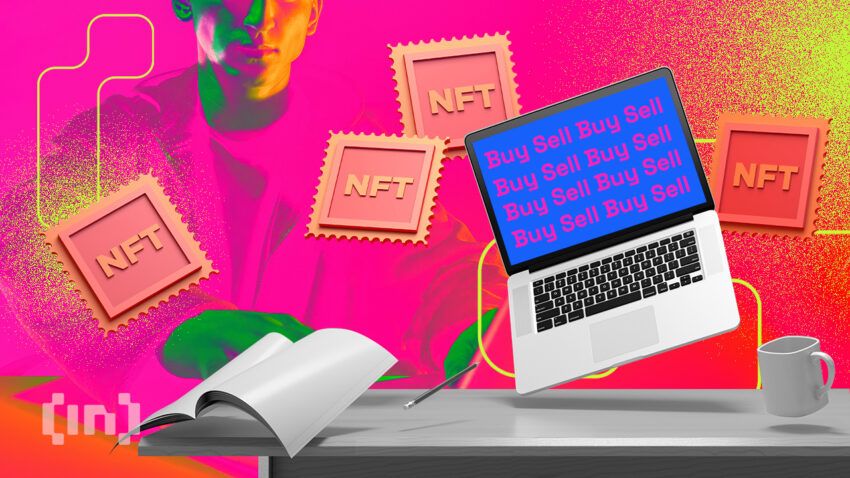Blockchain technology has the potential to revolutionize e-commerce, introducing a new level of transparency, security, and verifiability to digital transactions. With the popularity of non-fungible tokens (NFTs), businesses and individuals are becoming increasingly curious.
In response to this growing interest, solutions have begun to emerge that endeavor to make these digital assets more user-friendly and accessible, in particular to web2 native businesses and individuals. Here’s how Shopify got involved and how to use the platform to create and trade NFTs.
- What are the technical barriers to NFT adoption?
- Overcoming these obstacles: A step-by-step guide
- What does this actually mean for the e-commerce industry?
- E-commerce as an opportunity for the blockchain industry
- Can Shopify help facilitate mainstream NFT adoption?
- Frequently asked questions
- About the author
What are the technical barriers to NFT adoption?

One of the key challenges to the mainstream adoption of NFTs stems from the intricacies surrounding the use of crypto, blockchain technology, and digital wallets. Integrating these nascent technologies into a business model in a meaningful way is often difficult. This acts as a significant deterrent to many individuals against engaging with NFTs.
Technical complexities and the requirement for specialized knowledge have sometimes served to create a rift. Those eager to participate in the NFT ecosystem are incapable of doing so. This is due to a lack of accessible, user-friendly, and web2-compatible tools.
Overcoming these obstacles: A step-by-step guide
An example of one such solution currently on the market comes vis-a-vis Venly’s Shopify App, which helps users create, buy, and sell NFTs. Here’s how it works, step-by-step.
1. Create the NFT
A specific NFT’s details, such as its title, description, price, and desired quantity, can easily be customized within the app. Whether it’s digital artwork, unique designs, or any other eligible creation, merchants utilizing the app integration can ensure that their NFTs adhere to industry standards and reflect their desired creative vision.
2. Display in the E-Store
Once the NFTs are created, merchants can showcase them as products within their Shopify store. In doing so, they can provide compelling descriptions and high-quality images or videos and showcase unique offerings, and add any additional information that might help potential buyers understand the value, uniqueness, and significance of their NFT offering.
3. Automated minting
When a customer successfully purchases an NFT, the app automatically takes care of the entire minting process. Currently, it facilitates minting NFTs on Polygon, Avalanche, and Hedera. Merchants can mint on their chain of preference.
4. Wallet creation
To simplify the buyer’s experience further, Venly automatically creates a blockchain wallet for every customer who doesn’t already have one. This eliminates the need for customers to set up a blockchain wallet independently, one of the core obstacles currently preventing many individuals from exploring the digital asset space. As such, the process of purchasing an NFT becomes as seamless as possible.
5. Track sales
Through the app’s dedicated “Orders” tab, merchants can easily track their NFT sales. They can monitor the minting and distribution status of each of their NFTs. This also allows them to access valuable insights regarding sales performance and fulfillment details.
6. Set exclusivities
Using the features provided by Shopify, merchants can manage their inventory and set exclusivities for their NFTs. They can choose to create limited edition designs or set a maximum supply for their collection, allowing creators to enhance the scarcity and desirability of their creations, ultimately making them more appealing to collectors in the space.
What does this actually mean for the e-commerce industry?
In offering e-commerce tools specifically designed to simplify the creation and sale of NFTs, coupled with a core focus on providing a user-friendly approach, individuals can easily navigate buying or selling an NFT, regardless of their technical expertise.
Ultimately, this breaks down the barriers currently in place for adopting web3 and blockchain technology. These types of solutions not only benefit traditional web2 companies, allowing them to avoid the costly and time-consuming processes of hiring a full new team of developers and carrying out a complete overhaul of their current technology tools; they also allow creators and collectors operating on a much smaller scale unprecedented access to this emerging technology. This can unlock the potential for entirely new and diversified streams of income.
What’s more, even at this early stage of adoption, we are beginning to see an increasing number of traditional organizations dipping their toes into web3 waters and exploring the use of NFTs in a variety of interesting, innovative, and exciting ways.
The Nike and Adidas examples
2023 has seen two titans of the world of sports, Adidas and Nike, embark on a purposeful foray deeper into web3 waters.
Nike did so by unveiling its first .Swoosh NFT digital sneaker drop, titled ‘Our Force 1 (OF1)’, and consisting of Polygon virtual sneaker NFTs designed to pay tribute to the iconic Nike Air Force 1 sneaker.
Adidas, on the other hand, has built upon its ‘Into The Metaverse’ ecosystem, originally launched in December 2021, by releasing Chapter 1 of their ALTS Dynamic NFT Collection, a collection of eight different “ALT[er] egos,” with each corresponding to different rarity traits and an interactive storyline.
As more big brands explore this space, it is only a matter of time before merchants, creatives, and collectors of all sizes do so too. Those that don’t run the risk of missing out on technological advancement with enormous potential upside.
E-commerce as an opportunity for the blockchain industry

Incorporating immutable, decentralized blockchain technology into e-commerce effectively enables proof of ownership, scarcity, and authenticity for NFTs, ensuring a new level of trust in this industry. This opens up a whole host of revolutionary possibilities within e-commerce to a variety of different sectors. These extend far beyond art and collectibles. From gaming to virtual real estate and music platforms to many other predominantly online industries, the options are vast.
All things considered, the e-commerce market presents a massive opportunity for the blockchain industry to tap into mainstream viability. By integrating NFTs and blockchain technology into established platforms like Shopify, the potential for growth and innovation is immense.
Furthermore, the intersection of blockchain and e-commerce allows for the creation of novel business models, enhanced customer experiences, and new avenues for monetization. As businesses and individuals embrace NFTs, the market will evolve, pushing the boundaries of possibility in the digital asset space.
Can Shopify help facilitate mainstream NFT adoption?
Early solutions that bring web3 technology to the fingertips of web2 users and enable these individuals to participate in the web3 industry without the need for extensive blockchain knowledge will be critical in turning the tide on mainstream adoption.
By simplifying the process of selling NFTs, solutions that leverage the status and usability of existing web2 powerhouses will play a pivotal role in facilitating a web3 transition for the e-commerce industry as a whole.
Frequently asked questions
How does blockchain technology revolutionize e-commerce?
What are the challenges for mainstream adoption of NFTs?
How can businesses and individuals get involved with NFTs?
About the author

Stefan is the Head of Marketing + Community at Venly, a developer-friendly blockchain technology provider specializing in wallet, NFT, and marketplace solutions. As a strategic and technology professional, Stefan is passionate about metaverses, (blockchain) gaming, NFTs & new technologies.
Stefan is convinced that creating the right metaverse strategy will be one of the biggest challenges for many games, companies, and brands. He strongly believes in the powerful combination of blockchain, gaming technology, and cryptocurrency. Blockchain gaming in the metaverse will become huge in the upcoming years, and it’s here to stay.
Disclaimer
In line with the Trust Project guidelines, the educational content on this website is offered in good faith and for general information purposes only. BeInCrypto prioritizes providing high-quality information, taking the time to research and create informative content for readers. While partners may reward the company with commissions for placements in articles, these commissions do not influence the unbiased, honest, and helpful content creation process. Any action taken by the reader based on this information is strictly at their own risk. Please note that our Terms and Conditions, Privacy Policy, and Disclaimers have been updated.




